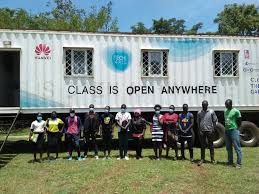Kenya’s Ministry of Information, Communication, and the Digital Economy has been spearheading numerous initiatives aimed at equipping the country’s youth with essential digital skills. These programs are designed to bridge the digital divide, enhance employability, and create opportunities in the global digital economy.
Huawei DigiTruck: Bringing Digital Skills to Remote Areas
One of the standout projects under this digital transformation drive is Huawei’s DigiTruck Initiative, launched in 2019 in collaboration with the Ministry, county governments, and training partners like Computers for Schools Kenya. This mobile classroom, repurposed from a shipping container, is equipped with laptops, smartphones, and Virtual Reality headsets, providing hands-on digital training in remote areas.
Since its inception, DigiTruck has trained over 6,000 youth, enabling them to access online education, remote jobs, and digital trade opportunities. In 2024 alone, 1,648 youth across six counties—Trans-Nzoia, Kiambu, Murang’a, Nairobi, Uasin Gishu, and Marsabit—benefited from the program, with women making up 55% of the trainees. Leaders such as John Kiarie, MP for Dagoretti South, have lauded the initiative for its role in ensuring every school-leaving youth gains fundamental ICT skills.
Ajira Digital: Unlocking Online Work Opportunities
The Ajira Digital Program, another government-backed initiative, is dedicated to training and mentoring youth to access freelancing and gig economy jobs. The program’s goal is to empower over one million young people annually by providing training in digital and remote work, ensuring Kenya becomes a key labor destination for global digital work platforms. Ajira Digital places a strong emphasis on youth and women empowerment, further strengthening the Ministry’s vision of inclusive digital participation.
Digital Skills Training Program: Mass Digital Literacy
The Ministry, through the ICT Authority, has also launched the Digital Skills Training Program, an ambitious plan targeting 20 million citizens. The initiative provides different levels of training, from basic ICT literacy to advanced digital skills, cybersecurity, and software development. By focusing on a wide demographic—including students, women, and senior citizens—this program ensures digital literacy is accessible to all.
DigiKen Initiative: Fostering Innovation Hubs
The DigiKen Initiative is another significant move by the Ministry, aimed at establishing Digital Innovation Hubs (DiHs) across the country. These hubs are designed to support entrepreneurship, tech startups, and skills training for youth and women in marginalized communities. Fifteen hubs have already been established, creating a network of tech-driven opportunities in Kenya’s innovation ecosystem.
Community Digital Champions: Grassroots Digital Inclusion
Recognizing the need for localized digital literacy efforts, the Ministry has been training Community Digital Champions (CDCs) to act as grassroots digital trainers. In counties like Busia and Mandera, these champions help train citizens, particularly in rural and underserved areas, ensuring digital inclusion reaches even the most remote regions.
Public Sector Digital Training: Enhancing Government Efficiency
To ensure government efficiency in a digital age, the Ministry, in partnership with organizations like Huawei Kenya, has introduced public sector digital capacity-building programs. These efforts equip government employees with critical digital skills, ensuring secure and efficient e-governance and improved service delivery.
Through a combination of private-public partnerships, mobile digital classrooms, online work platforms, and grassroots digital literacy programs, Kenya’s Ministry of Information, Communication, and the Digital Economy is making significant strides in empowering youth for the digital age. These programs not only enhance individual livelihoods but also contribute to Kenya’s broader economic transformation, fostering a tech-savvy workforce ready to compete in the global digital economy.










